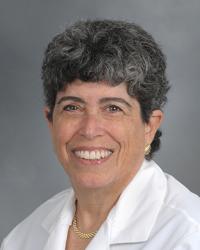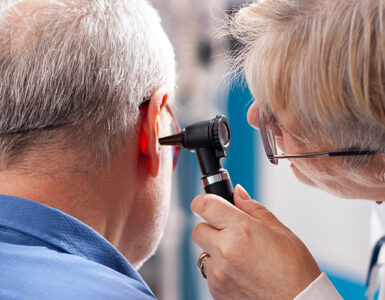The New York State Department of Health has issued a Health Advisory due to rising measles cases and hospitalizations in parts of the United States. Measles is a highly contagious virus that spreads easily through coughing and sneezing. The best way to protect yourself and others is by ensuring you are fully vaccinated with two doses of the measles, mumps and rubella (MMR) vaccine. In this episode of HEALTH Yeah!, Stony Brook Medicine experts discuss measles and what you need to know about symptoms, exposure and protection.
The Experts
What You’ll Hear in This Episode
- 00:00 Opening and Introductions
- 00:50 What is the current situation with measles on Long Island?
- 1:30 What are hospitals and outpatient practices doing to address this?
- 2:20 How contagious are measles and how can we minimize transmission?
- 3:55 What can be done to protect children under one year of age?
- 5:03 What about older populations?
- 6:20 Vaccination and other preventive measures
- 8:25 Treatment
- 9:55 Signs and symptoms
- 11:10 School outbreaks
- 12:30 What can measles lead to?
- 12:46 Early vaccination
- 13:38 Exposure
- 15:06 Is there a link between the measles vaccine and Autism?
- 16:00 Are measles deadly?
- 16:20 Hospitalization rates
- 17:00 Telemedicine/Telehealth
- 19:16 Closing Remarks
Full Transcript
00:00 Opening and Introductions
Announcer
Welcome to HEALTH Yeah!, where experts from Stony Brook Medicine come together to discuss topics ranging from the complex inner workings of an infectious disease to tips and tricks for staying safe and healthy all year long.
Continue Reading
Sharon Nachman, MD
Hello, my name is Sharon Nachman. I’m the division chief for pediatric infectious disease at Stony Brook Children. I’m here today with two of my colleagues to talk about measles. Susan, please introduce yourself.
Susan Donelan, MD, FSHEA
Sure. My name is Dr. Susan Donelan. I’m an infectious diseases adult physician by training. I also serve as the medical epidemiologist for all of Stony Brook Medicine.
Lori Ellis, MD
I’m Dr. Lori Ellis. I’m a general pediatrician at Stony Brook Children’s at the Smithtown Office.
00:50 What is the Current Situation with Measles on Long Island?
Sharon Nachman, MD
Thank you. So we’re hearing a lot about measles in the news, and I’m sure you’re like me, getting constant texts and emails from all your friends and neighbors asking what to do.
So, Lori, what are the things you’re hearing about in the office?
Lori Ellis, MD
A lot of fear and people scared that measles is here again. People asking what they need to do to protect themselves is really the biggest question. So my first recommendation is to make sure you are vaccinated. Check your vaccine status, talk to your primary care doctor and see if you’re vaccinated.
1:30 What are Hospitals and Outpatient Practices Doing to Address This?
Sharon Nachman, MD
So, Susan, I’m sure you’re really hearing a lot about how the hospital outpatient practices are getting ready. What kind of information can you share with us?
Susan Donelan, MD, FSHEA
Well, even before COVID, we have been putting into place questions for people calling in to see what their symptoms are and to see where they’ve been, if they traveled, that type of thing. And as with COVID, when patients are potentially infectious, sometimes we have them wait in the car, for COVID we had them swabs.
So we may have people waiting in the car until we can prepare a room for them, especially in the outpatient areas, prepare a room for them where they can be safely evaluated in the emergency department, in triage. We have a process called identify, isolate and inform. And that is really good for any potential incoming infectious diseases. And so far that’s been working well
2:20 How Contagious are Measles and How Can We Minimize Transmission?
Sharon Nachman, MD
So, Lori, I’m sure you’re getting asked a lot about how contagious is measles. What do you tell families?
Lori Ellis, MD
So measles is contagious; it is really contagious. So thankfully, the vaccine works. So by being vaccinated, it does protect you. But if you are in a room with someone who has measles and you’re not vaccinated, then there’s really a good chance that you yourself will contract measles.
Sharon Nachman, MD
So as you can imagine, measles is one of our most highly infectious viruses. We tell families it aerosolizes, or it’s the air, for 20 to 60 feet after someone’s coughed or been breathing. So you’re right. Even after you left the room, it’s still there. But even when you have a child walking down the hallway and you didn’t know they were there and you walk into that same hallway, you or your child can still get measles.
So what are we doing about that for our hospital and telling our staff about how contagious the virus is?
Susan Donelan, MD, FSHEA
Well we do have information both on the external-facing website as well as the internal-facing website, which would be more specific for health care workers. The best thing to do is if you think someone has measles, just like flu or something like that, you put a mask on them.
If they are able to wear a mask, then a well-fitted surgical mask will at least minimize transmission before we can have them escorted into the proper room.
Sharon Nachman, MD
Right. And you’re right, we don’t want them walking around any of the places and, you know, I always worry about going to the grocery store and looking around and saying, oh no, does that person have a rash or does someone else have a rash?
3:55 What Can Be Done to Protect Children Under One Year of Age?
So I guess the question then comes up for the families who have children that are under a year of age and they can’t get a vaccine. What kind of advice are you giving those families?
Lori Ellis, MD
So children six months to 11 months old, they can actually get the vaccine early in the setting of outbreak settings. So we definitely have that available. Or if we’re planning on traveling to an area where measles is running rampant, we would recommend those children to be vaccinated.
For children under six months of age, they are actually still protected from mom’s antibodies. However, what we recommend is just trying to keep your bubble safe. You want to have everybody who you are around know that they’re vaccinated, know that they’re protected.
Sharon Nachman, MD
Most of the women who are having babies these days are young adults, about 45 years of age. And for those people, they’ve all gotten probably two doses of vaccine. So those babies are, in fact, protected.
Who’s not protected? Believe it or not, we do have adults who have not been vaccinated. So while they themselves are not protected, neither are their infants.
5:03 What About Older Populations?
And I guess the question also comes up, what about our older population? What are you telling those families?
Susan Donelan, MD, FSHEA
Well, many of the people who were born before 1957 were naturally immunized by virtue of the fact that they actually got measles. Many, many times that lasts for a lifetime.
There are some people that are immune compromised or have hematologic problems. People that are immune compromised should talk to their physicians. They may want to have measurements made of their immunity or discuss, if they lack immunity for some reason, whether something like immune globulin would be indicated, in case they get exposed.
Sharon Nachman, MD
Right. It’s the setting. It’s all about where you’re going, where you’ve been. And I agree with you, the families that are traveling, they’re going to areas that have lots of measles. And we need to make sure that they don’t get measles where they’re away and they don’t bring it back to us.
6:20 Vaccination and Other Preventive Measures
Susan Donelan, MD, FSHEA
I think it’s also important to recognize that, you know, we live in a very multicultural population and there are people that come from elsewhere whose vaccination records are not going to be in our New York state system.
They may not know what their vaccine status is. They may not recall whether they had measles or not. And so they may, in fact, also be susceptible. I suggest that anyone who is not sure about their vaccination status or their status as to whether they had measles, should before they are exposed or before it becomes rampant in their community, check with their health care provider to see if they in fact are already immune or they need a dose of a vaccine.
Sharon Nachman, MD
And remember, this vaccine is available at all of the pharmacies across Long Island and even in New York. So it’s not hard to find it. And it’s available and easy to administer. And extra doses of the vaccine, in fact, do not cause any harm. If you’ve had the virus and you get a dose of vaccine. Good news. We’ve boosted your immunity. And if you haven’t had the virus and just got a vaccine. Good news. Another dose of vaccine also only boosts your immunity.
So there’s really no downside to getting an extra dose of vaccine either. Even you’ve had the disease and didn’t know it or had the vaccine and don’t know it.
8:25 Treatment
And I’m sure you’re all hearing about, well, how about if I just take vitamin A? Am I going to be protected or cod liver oil? What do you tell the families about vitamin A, which is the right setting for it to be used in?
Lori Ellis, MD
So thankfully, that question actually hasn’t come up more. My questions have been when can I get my child vaccinated? Is my child fully vaccinated? And those are the questions I prefer. But as far as cod liver oil and the vitamin A, that’s really in the hospital setting, it’s definitely not something I am recommending in preparation or anticipation.
Sharon Nachman, MD
So interestingly enough, the vitamin A is indicated for children who are malnourished and who have measles. And I want to say politely, I suspect our children in Long Island are really not malnourished. What’s nice about the food source in the United States is there’s lots of foods already have vitamin A in them. So the likelihood that we’ll see a malnourished child on Long Island or someone who’s deficient in vitamin A is vanishingly small. So thinking that vitamin A is going to protect them, absolutely not. Will it help treat someone who, in fact, has measles? Well, we certainly would administer it. But the likelihood that it’s going to help in any way, it really won’t.
And I’m sure, Susan, you’re hearing questions about patients who have measles and they get measles pneumonia. Where’s the reason to give an antibiotic in those situations?
Susan Donelan, MD, FSHEA
If there’s a suspicion for bacterial superinfection of the damage that has been caused by the viral pneumonia, then that would be an indication for antibiotics.
But antibiotics per se do not work in the setting of a viral infection.
Sharon Nachman, MD
I guess it bears repeating that antibiotics are good for bacteria. They don’t do anything for viruses. And the other thing I sort of wanted to comment about is this whole discussion I’m hearing about cod liver oil. And what are your thoughts on cod liver oil?
I can tell you mine in that cod liver oil is something that is not FDA approved. So in fact, it’s considered a food. And we really don’t know what’s in that type of supplement. And I always tell families, you have to be careful what your child is taking. You really want to know what’s in that product and something that’s not regulated, probably not the best thing to be using.
Susan, have you heard people using it?
Susan Donelan, MD, FSHEA
Fortunately, I have not. I know it’s been in the news. But most people have their own opinions of it and I am not usually approached for those kinds of questions.
9:55 Signs and Symptoms
Sharon Nachman, MD
So I’m sure you’ve seen lots of pictures of kids with measles. What are the things you tell parents to look for?
Lori Ellis, MD
So measles starts kind of like your normal virus, which is one of the reasons it probably gets spread so easily. It starts with a cough, runny nose, red eyes and fevers. One of the more specific things with measles are these little light grayish spots that happen in the inside of your mouth about 2 to 3 days into the respiratory symptoms, and then around 3 to 5 days into the illness, you get this rash from head to toe.
So when I was in medical school, when we were learning about measles, we learned it’s like you’re dumping a bucket of measles paint over your head and it goes from your head all the way down. And then kids are also pretty angry and they’re sad and they’re mad and they’re very cranky.
Sharon Nachman, MD
And I think it’s really important to remember that before that very first sign of any kind of rash, they are really highly infectious. Too often I hear of families that have to go to work and the child has some fever and feeling unwell. “ Oh just give them some Tylenol or Motrin and send them to school.” This is probably not the right time to do that.
11:10 School Outbreaks
And so what are we hearing about now? If there’s an outbreak in school, what kind of advice should we be telling our community?
Susan Donelan, MD, FSHEA
Well, if there’s an outbreak in the schools, then the local departments of health will be directing much of the community mitigation strategies for maintenance. But everyone should know their immune status before it hits your neighborhood and your school.
If you are having an outbreak in the school, you want to talk to the pediatrician to see if you have any children that are eligible for either an early vaccine between six and 11 months because of the outbreak situation, or if they’re due for their 12 to 15 months, or their 4 to 6, which can be also given early if need be in an outbreak setting.
You want to also make sure that you are on the outlook for any low grade fever, cough, runny nose, watery red eyes. And when the fever is not so prominent, then the kids are often getting something like a Children’s Cold and Flu, and that has some Tylenol in it or Advil. When the rash hits, that’s when the fever really spikes and you want to make sure that you’re aware of your own family’s health and you take the proper precautions to prevent anything from spreading to others.
Sharon Nachman, MD
When I tell families who say to me, I guess it’s okay, my kid gets measles, they’ll be just fine afterwards. As you can imagine, that’s definitely not true. And one of the things I tell them is that the size of the fever and the flu like illness and the rash, measles also causes a very bad pneumonia and also causes inflammation of the brain. And we don’t want to see either of those.
12:30 What Can Measles Lead To?
So, Lori, are you seeing a lot of families now who are due for their year four dose coming in early? What do you tell them?
Lori Ellis, MD
So I’m happy to vaccinate and give an early dose if there is worry, since it’s around and it might be locally. I am also recommending to consider keeping an eye out on the news and to see how local it is and if it really is right in our backyard.
But it’s completely safe, it’s protective, and it also counts towards a childhood vaccine schedule. If you give a second dose of measles as soon as 28 days after the first dose.
12:46 Early Vaccination
Sharon Nachman, MD
And that’s really, really important. This idea that, if I didn’t give it at four years, it doesn’t count. No, that’s not true. Just not true. And I think that’s really important for families. If we do see more cases, we will be recommending that children come in early. Remember, it’s not just the school age children. It’s the children in daycare who are going to be exposed.
And we’ve all seen children in daycare sharing toys and coughing and breathing on each other all the time while they’re away.
13:38 Exposure
Susan Donelan, MD, FSHEA
I think one of the things that’s also important now that you mention your own backyard type of thing, a lot of people that I’ve been talking to in the last week or so were really, you know, fixated on the idea that it was in New Mexico, in Texas, and not here.
But what we’re seeing is that while that may be the ones that are in the news, the fact is that there are cases of measles in the New York metro area as well as the states surrounding New York and in the Northeast. So I think the preparation for coming into your neighborhood or coming into your school, this is the time.
Sharon Nachman, MD
The measles cases that we’ve seen in New York were perhaps not related to the Texas/New Mexico outbreak. And why did those come? Well, it’s very easy. Those children were traveling out of the country or out of state and they’re not vaccinated. And they are actually absolutely able to get measles someplace else and bring it to New York. So you’re right. Measles gets on a plane just like any passenger does and flies anyplace it wants to around the world. And it doesn’t care who you are, where you’re from.
Susan Donelan, MD, FSHEA
We have three international airports in close proximity to where we live. We have to remember that.
Sharon Nachman, MD
And measles gets on planes very, very easily.
Lori, any other advice that you’re giving families about measles vaccine and autism or any links or no links?
15:06 Is There a Link Between the Measles Vaccine and Autism?
Lori Ellis, MD
Well, the MMR vaccine is 100 percent definitely safe. There is no link between autism and the MMR vaccine. And actually, thankfully, that question hasn’t been coming up as often lately. And I feel like the word has gotten out that the measles vaccine really is safe.
Sharon Nachman, MD
And I think it bears repeating that study after study has shown quite nicely that there is absolutely zero link between measles vaccine and autism. People always thought there might have been something because we see autism in young children and young children get vaccines. But in fact, the data does not support it and there is essentially no link. I think we also have to remember this vaccine saves lives and that can’t be said often enough.
16:00 Are Measles Deadly?
Measles does kill. And we recently saw two deaths, one an adult who was not vaccinated and one in a school-aged child who was not vaccinated. And those were both regular, healthy individuals that were not malnourished, had no comorbidities or anything. They still died of their measles.
16:20 Hospitalization Rates
What’s the hospitalization rates that we expect in measles?
Susan Donelan, MD, FSHEA
You know, traditionally we’re looking at approximately one out of every four persons potentially requiring hospitalization. Of course, it depends upon whether they have had any vaccine, one vaccine or occasionally two vaccines.
But for the unvaccinated population, we can expect approximately 25 percent hospitalization rates.
Sharon Nachman, MD
And that’s what we’re seeing now in New Mexico and Texas. About 20 to 25 percent of those children and adults who are not vaccinated or have no record of vaccine, those are the ones who are getting hospitalized.
17:00 Telemedicine/Telehealth
What are you doing, Lori, for the families who perhaps have traveled or got into contact with someone with measles? What are you doing for the other children in those houses?
Lori Ellis, MD
Assessing everybody’s vaccine status, seeing who’s protected and who’s not. If there’s a young child in the home who is over the age of six months, I would recommend an early vaccination for that child. And hopefully everybody is protected.
Sharon Nachman, MD
Close observation. And we do a lot of telemedicine to find out what’s going on. And telemedicine. has really brought about a change in how we talk to those families because we can now see them and talk to them and see the child at the same time. And that really does help quite a bit.
Lori Ellis, MD
That is our recommendation for anybody who has any concerns about their child having measles, any symptoms of measles would be to call and to schedule a telehealth visit.
Sharon Nachman, MD
And telehealth works on your computer and on your phone, and it can be done in your car. I’ve seen people doing telemedicine while they’re driving or parked, But yes, and it really makes a big difference because you can see someone right away. And I imagine you have no issue with having enough measles vaccine or MMR vaccine?
Lori Ellis, MD
No, none at all.
Susan Donelan, MD, FSHEA
And I want to add to that, you know, in the current climate, it’s a good idea to understand your vaccination status. I think this is also an excellent opportunity to make sure that your telehealth system is set up for your primary care.
You don’t want to try to figure that out when you need it, you know, get it done and make sure that you’re on the patient portal. Make sure you know how to do telehealth and check your immunization status.
Sharon Nachman, MD
Great. I think we’ve talked about the measles vaccine, how safe and effective it is. We’ve talked about treatments that only perhaps work in malnourished children, but don’t represent our patient population.
So I think that we are very lucky we live in Long Island. We have enough measles vaccines around. We have enough providers and we know how to reach them. And we have a great New York State Department of Health and they are aggressive about looking into each case of measles or possible measles. And we have the labs that can be run to prove if someone has measles or not.
So thank you very much. This has been really helpful and we look forward to hearing more discussions about how to prevent measles and get your vaccine.
19:16 Closing Remarks
Announcer
Stony Brook Medicine is Long Island’s premier academic medical center. We transform lives through scientific discovery, education and care, and we bring together innovative research, advanced education and extraordinary health care expertise to set the standard for how healthy communities thrive. For more information, visit Stony Brook Medicine or follow us on social media.














